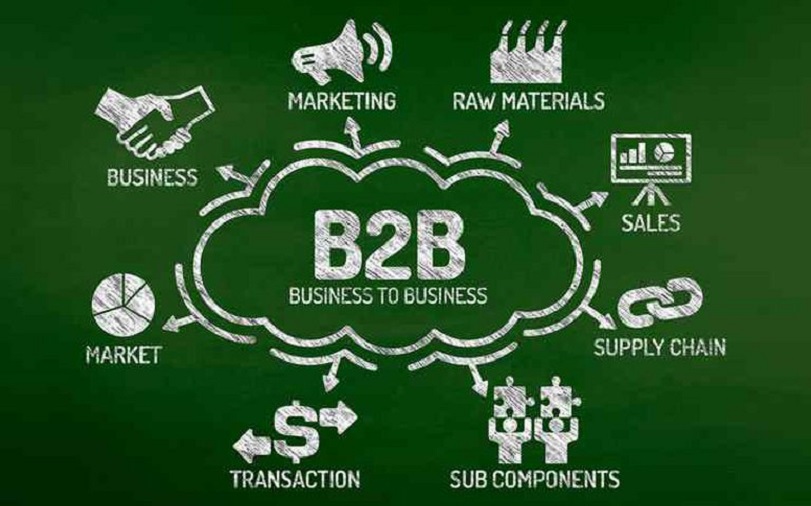Economy
Top 5 Trends Reshaping B2B Marketing in 2023

Introduction
In recent years, we’ve seen a dramatic shift in the landscape of B2B marketing. With the advent of new technologies and changes in buyer behaviour, businesses are having to adapt their marketing strategies to stay ahead of the curve. Right from allocation of budgets to utilization of resources the trends a changing dramatically.
According to a recent survey conducted by Statista among B2B businesses worldwide, a significant 50% of respondents reported their intention to increase spending in the upcoming year. This highlights a positive trend in the industry’s growth and suggests that companies are willing to invest more in marketing strategies to achieve their goals.
Furthermore, another survey revealed the most popular marketing tactics implemented by B2B businesses, with email marketing being the most widely used tactic at 84%. Social media and social media advertising ranked second at 75%, followed by blogging and content marketing at 69%. SEO ranked fourth at 60%, while tradeshows and events came in fifth at 54%.
These findings indicate that digital marketing continues to dominate B2B marketing efforts, with email and social media being the primary channels used to reach target audiences. Here are some of the top trends that are reshaping B2B marketing:
- The rise of account-based marketing:
With the increased focus on developing relationships with key accounts, account-based marketing has become one of the most popular strategies among B2B marketers. This tailored approach allows businesses to better meet the needs of their most valuable customers.
- The power of content marketing:
In order to reach and engage today’s buyers, businesses need to create compelling content that addresses their specific pain points. From blog posts and eBooks to infographics and webinars, high-quality content is essential for driving demand and generating leads.
- The importance of data-driven decision making:
In order to be successful, businesses need to make decisions based on data rather than gut instinct. By tracking key metrics such as website traffic and conversion rates, marketers can gain insights into what’s working and what isn’t, and adjust their strategies accordingly.
- The growth of social media:
Social media has emerged as a powerful tool to reshaping B2B marketing, allowing them to build relationships with potential customers and create brand awareness. However, with so many platforms to choose from, it’s important to select the right ones for your.
Trend #1: Artificial Intelligence and Machine Learning
Artificial intelligence (AI) and machine learning are two of the most talked-about topics in the business world today. And for good reason: these technologies have the potential to transform the way businesses operate and interact with customers.
In marketing, AI and machine learning can be used to personalize messages, understand customer needs and preferences, and even predict future behaviour. These capabilities are already being used by some of the biggest brands in the world to drive real results.
For example, Amazon uses AI to personalize shopping recommendations for its customers. Netflix uses machine learning algorithms to recommend shows and movies that users are likely to enjoy. And Facebook uses AI to help businesses target ads more effectively.
As these examples show, AI and machine learning are reshaping b2b marketing landscape. Here are three trends to watch out for:
- Personalization will become more important than ever before.
- Chatbots will become commonplace (and more sophisticated).
Trend #2: Automation of Sales and Marketing Processes
MyContactForm.com notes that with the increase in internet usage and online purchasing, many businesses are finding that regular “outbound” marketing methods are less effective than they used to be.
The costs of these methods – like print advertising, TV commercials, and direct mail – are also on the rise. In response, businesses are turning to more modern “inbound” marketing strategies that make use of digital tools and platforms.
One such trend is the automation of sales and marketing processes. By using software to automate repetitive tasks, businesses can free up time and resources for more creative and strategic tasks. Additionally, automation can help to improve accuracy and consistency in data collection and analysis. This can lead to better decision-making about where to allocate resources for maximum impact.
There are a number of different software applications available that can help with automation of sales and marketing processes.
MyContactForm.com notes that some popular options include Hub Spot Sales, Pardot, Marketo, Eloqua, and Infusionsoft. However, it’s important to select the right tool for your specific needs; not all of these applications will be a good fit for every business.
If you’re thinking about implementing automation in your sales or marketing process, myContactForm.com recommends doing some research to determine which application will work best for you. They also suggest starting small by automating only a few tasks at first, so that you can get
Trend #3: Increased Role of Emotional Connections
As we head into 2020, it’s clear that one of the biggest trends reshaping b2b marketing is the increased role of emotional connections.
In a world where consumers are bombarded with marketing messages from all angles, brands that can create an emotional connection with their audience are more likely to cut through the noise and stay top of mind.
One way to create an emotional connection is to tell stories that resonate with your audience. This could be sharing customer stories, or creating content that highlights your brand’s values. Another way to foster an emotional connection is to make it easy for customers to connect with your brand on a personal level. This could be through offering customizable products, or creating a social media hashtag that lets customers share their own experiences with your brand.
No matter what approach you take, remember that emotion should be at the heart of your b2b marketing strategy. By creating an emotional connection with your audience, you’ll be able to build long-lasting relationships that will pay off in the form of loyalty and repeat business.
Trend #4: Rise of Integrated Platforms for Seamless Execution
The rise of integrated platforms is one of the top trends reshaping b2b marketing. Seamless execution across all channels and devices is becoming increasingly important to b2b marketers, and an integrated platform can provide the foundation for this.
By centralizing data and functionality on a single platform, b2b marketers can more easily manage campaigns, analyse performance, and optimize results. Additionally, an integrated platform can help marketers connect with customers across channels in a consistent and personalized way.
Trend #5: Shift towards Digital advertising and Social Media Outreach
There are few things more important to the success of your business than having a solid marketing strategy. And while some things never go out of style—like word-of-mouth marketing, for example— other elements of your marketing mix will need to be updated to stay current. With that in mind, here are five trends that are reshaping b2b marketing:
- The rise of digital advertising
As consumers continue to spend more time online, it’s no surprise that businesses are following suit and investing more in digital advertising. In fact, according to a recent study by eMarketer, digital ad spending is expected to surpass $100 billion by 2021. From search engine optimization (SEO) to social media ads, there are a variety of ways to reach your target audience online. And with platforms like Google Analytics, you can track your campaign’s performance and make adjustments accordingly.
- The power of social media outreach
Social media is one of the most powerful tools at your disposal when it comes to marketing your business. Not only does it provide an avenue for promoting your brand and connecting with potential customers, but it also allows you to gather valuable feedback and insights. When used effectively, social media can be an invaluable asset in growing your business.
- The importance of mobile marketing
With over two billion active smartphones users worldwide, it’s clear that mobile is not going anywhere anytime soon. And as such, businesses need to find ways to reach
Conclusion
In conclusion, 2023 is likely to be a watershed year for reshaping B2B marketing trends. The data and demand are all pointing in the direction of customization, artificial intelligence, collaboration and personalization as being essential elements of success. These five key trends that we talked about will go a long way towards reshaping what was possible with B2B marketing in the past and taking it into an exciting future. Embracing these changes now could mean you have a substantial head start when the time comes to reap their rewards.
Economy
CBN Reduces Interest Rate by 50 Basis Points to 26.50%

By Adedapo Adesanya
The Central Bank of Nigeria (CBN) has cut the interest rate by 50 basis points to 26.50 per cent from 27 per cent.
Nigeria’s apex bank announced this during its two-day 304th Monetary Policy Committee (MPC) meeting, which concluded on Tuesday in Abuja.
This comes after the country’s interest rate cooled in January to 15.10 per cent from 15.15 per cent, according to the National Bureau of Statistics (NBS), strengthening the case for a reduction.
The CBN Governor, Mr Yemi Cardoso, said all members of the MPC unanimously agreed upon the decision.
“The committee decided to reduce the monetary policy rate by 50 basis points to 26.50 per cent,” he said.
Mr Cardoso stated that the liquidity ratio was maintained at 30 per cent, and the standing facilities corridor was adjusted to +50 to -450 basis points around the monetary policy rate.
He said the committee retained the Cash Reserve Ratio (CRR) at 45 per cent for commercial banks and 16 per cent for merchant banks, while the 75 per cent CRR on non-TSA public sector deposits was equally maintained.
The CBN uses the MPR, which works as the benchmark interest rate, to manage inflation, macroeconomic stability, and liquidity.
Last November, the MPC retained the Monetary Policy Rate (MPR) at 27.00 per cent. The last time the apex bank cut interest rates was in September last year, to 27 per cent from 27.50 per cent after a series of easing in inflation.
Market analysts had argued for higher interest cuts due to results seen in the CBN’s inflation targeting framework. Meanwhile, some say the 50 basis points reduction will offer a temporary reprieve as inflation heads for a single-digit target in the coming months.
Economy
Grey to Cut Cross-Border Payment Costs with New USD Offering

By Adedapo Adesanya
A cross-border payments solutions company, Grey has expanded its business banking platform to include US Dollar corporate accounts, bulk international payments, and USDC stablecoin support, all integrated into a single system.
The company is positioning itself as a low-cost, faster alternative to traditional international banking, particularly for businesses in emerging markets as it enables companies to open US Dollar accounts, receive global payments, and send payouts to 170+ countries, including bulk transfers, within minutes.
Grey aims to solve common cross-border payment challenges, particularly the high transfer costs that often range between 6 and 7 per cent of transaction value, prolonged settlement cycles that can stretch across several days, and the limited access many businesses face when trying to open and operate foreign currency accounts. In addition, companies frequently contend with hidden intermediary fees and poor foreign exchange transparency, both of which undermine cost predictability and effective cash flow management.
By integrating USD business accounts and USDC stablecoin functionality into its platform, Grey enhances its value proposition around faster settlement, clearer pricing structures, improved cost efficiency, and broader global accessibility. The expanded capabilities enable businesses to manage international transactions with greater speed, transparency, and operational control.
“Businesses may operate without borders today, but access to reliable global banking remains uneven, particularly for companies in high-growth markets,” said Mr Idorenyin Obong, Co-founder and Chief Executive Officer of Grey. “We’re closing that gap and enabling businesses to move money faster, with greater transparency and control, wherever their clients or partners are based.”
“When payments are delayed, or costs are unpredictable, growth stalls,” added Mr Joseph Femi Aghedo, Chief Operating Officer and Co-founder of Grey. “Grey eliminates those friction points, giving businesses a faster, simpler way to manage payroll, supplier payments, and partner payouts across borders. Adding USD and stablecoin capabilities makes these benefits accessible to even more customers.”
Established in Africa in 2020, Grey has a presence in key markets, including the United States, the United Kingdom, and Europe, and has recently expanded its services and operations into Latin America and Southeast Asia.
Since its inception, the company has consistently enhanced its services to empower digital nomads worldwide, regardless of location. Grey’s offerings include multi-currency accounts, low-cost international money transfers, a virtual USD card, expense management tools, and robust security measures.
Economy
Quidax, Lisk to Unlock Stablecoins, On-chain Financial Opportunities

By Aduragbemi Omiyale
A partnership designed to expand access to stablecoins and on-chain financial opportunities for everyday users and businesses has been entered into between Quidax and Lisk.
The partnership provides a critical gateway for the developer community, as builders on the Lisk network can now leverage Quidax’s robust digital asset infrastructure to access stablecoins and local currencies at competitive rates.
This institutional-grade infrastructure is designed to power “future-forward” financial products, ranging from neobanks and cross-border payment platforms to regional exchanges and global fintech solutions. It will also allow Quidax customers to trade and move value seamlessly using USDT, USDC, LSK, and Ether (ETH) on the Lisk network.
The collaboration will also accelerate the adoption of Web3 solutions that solve real-world financial challenges for millions of customers across Africa by combining Quidax’s deep local liquidity and compliant framework with Lisk’s scalable L2 technology.
In 2024, Quidax became the first crypto exchange to receive a provisional operating license from Nigeria’s Securities and Exchange Commission (SEC).
“The partnership with Lisk enables us to extend our platform to serve more people and cater to the increasing demand from products and services that want to integrate our stablecoin and digital assets product to build products across Africa,” the Chief Infrastructure Officer at Quidax, Mr Morris Ebieroma, said.
Also commenting, the Ecosystem Lead for Africa at Lisk, Ms Chidubem Emelumadu, said, “Africa represents one of the most critical frontiers for blockchain innovation, where the demand for reliable and inclusive financial tools is urgent.
“Our partnership with Quidax expands access to stablecoins and on-chain financial opportunities for everyday users and businesses. At the same time, it gives founders building on Lisk the critical infrastructure they need to create solutions that can scale meaningfully across the continent,” she added.
-

 Feature/OPED6 years ago
Feature/OPED6 years agoDavos was Different this year
-
Travel/Tourism10 years ago
Lagos Seals Western Lodge Hotel In Ikorodu
-

 Showbiz3 years ago
Showbiz3 years agoEstranged Lover Releases Videos of Empress Njamah Bathing
-

 Banking8 years ago
Banking8 years agoSort Codes of GTBank Branches in Nigeria
-

 Economy3 years ago
Economy3 years agoSubsidy Removal: CNG at N130 Per Litre Cheaper Than Petrol—IPMAN
-

 Banking3 years ago
Banking3 years agoSort Codes of UBA Branches in Nigeria
-

 Banking3 years ago
Banking3 years agoFirst Bank Announces Planned Downtime
-

 Sports3 years ago
Sports3 years agoHighest Paid Nigerian Footballer – How Much Do Nigerian Footballers Earn



















